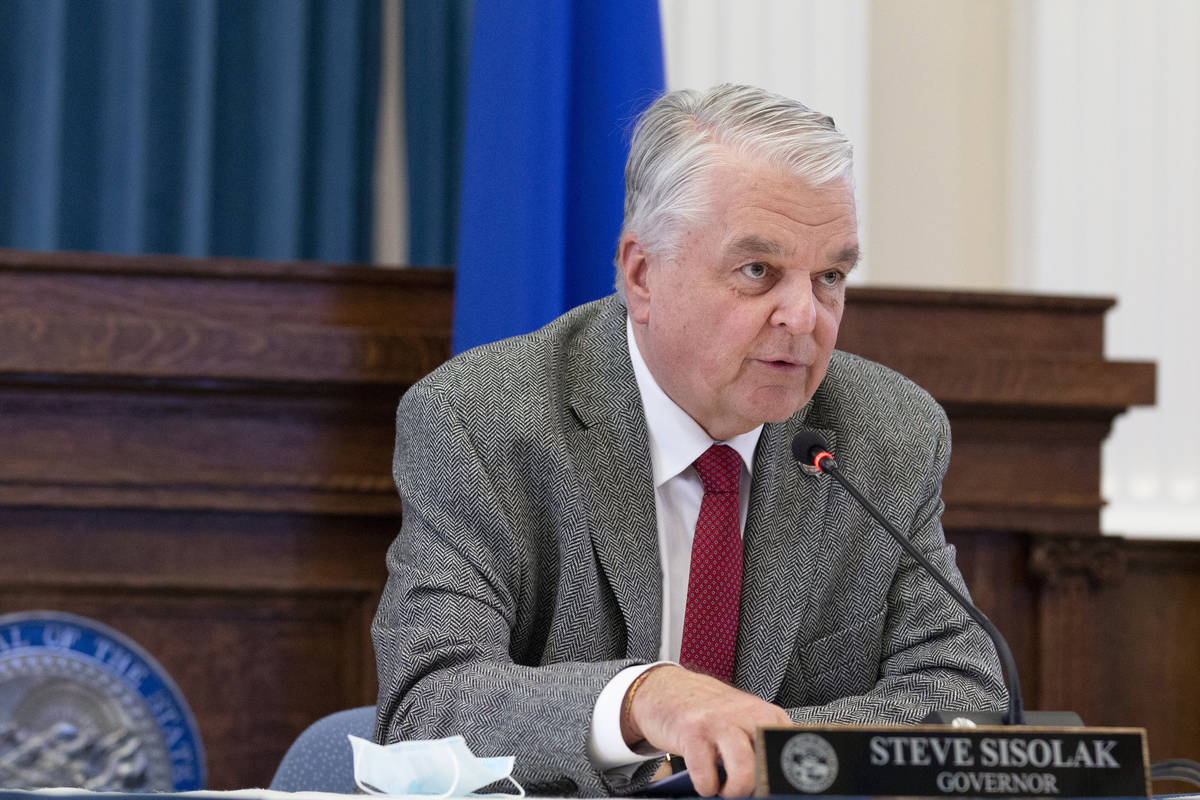No firm date to start reopening Nevada, governor says
CARSON CITY — Nevada schools will not reopen this spring, and nonessential businesses will stay closed until critical public health benchmarks are met, including a sustained decline in COVID-19 infections, Gov. Steve Sisolak said Tuesday.
Describing the state at “phase zero” of plans to relax social distancing directives that began March 15 with his order to shutter schools, the governor said the state’s timetable for reversing them would be driven solely by those health metrics, none of which have yet been seen.
“We’re doing everything we can to open up the economy as quickly as possible, but I will only do that when we meet the criteria set forth for gating and moving into phase one,” the governor said toward the end of an hourlong press briefing in the Capitol.
To reach phase one and begin to lift business closures, the state will need to see a not-yet-realized 14-day decline in new cases and hospitalizations from COVID-19, as well as sufficient capacity in the health care system to conduct contact tracing of infected people, expanded testing of people with coronavirus symptoms and more test processing by labs.
The state must also demonstrate a “sustained ability to protect our vulnerable populations,” such as nursing home and assisted living facility residents, Sisolak said.
“Once these items have been completed, we can move into the first phase to reopen confident that we have all the necessary protective measures in place,” he said. “As of right now, I cannot give you a firm date as to when we will meet all this criteria to begin phase one reopening plans. If we continue on this path, the date is on the horizon. Our behavior as Nevadans will ultimately help determine this day.”
As for schools, the governor said he had “made a difficult decision to continue educating our students through distance learning for the rest of this school year.”
State health and medical officials who are advising the governor on the state’s COVID-19 response joined him at Tuesday’s briefing, including a state epidemiologist and biostatistician, who reviewed projections that showed how social distancing directives have helped Nevada avoid worst-case predictions for the outbreak. As of Tuesday evening, the state had reported 3,937 confirmed cases of COVID-19 and 163 deaths from the illness.
But while models are promising, officials said Tuesday that they still do not have not enough data to say where the state is on the 14-day timeline.
“We have just recently started to see data to substantiate a plateau. However, there’s not sufficient data to indicate that we’ve actually started to see a significant decline in new cases,” said Kyra Morgan, a biostatistician with the state Department of Health and Human Services. “We’re looking not only at declining new cases. … We’re looking at hospitalizations, we’re looking at level of severity of these cases, what level of care do they need once they’re hospitalized. It’s not a single metric.”
The governor’s office will announce when the state enters that 14-day period, but Sisolak added: “In terms of determining where you are on the 14-day thing you don’t know until you’re partway into it and how it stands and (when) you go into it you can come back out of it.”
Overall, the state’s plan for the first phase of lifting restrictions mirrors federal guidelines. While the state moves toward that phase, Sisolak said the Governor’s Office of Economic Development would “be reaching out and connecting” with different businesses sectors and licensing boards on plans to reopen the private sector.
The state will follow federal phase one guidance that will prohibit in-person visits to senior living facilities and hospitals.
Bars will remain closed, also per that guidance. The medical advisory team will review guidelines on other businesses and activities such as elective surgeries, gyms, restaurants, movies, places of worship and sporting events.
“We could flip the switch and turn the lights back on, but our experts predict, and expert experience elsewhere in the world shows us, if we don’t do this in a controlled and informed manner, we’ll be hit like a tidal wave in two or three weeks,” the governor said. “The emergency is not over yet.”
Contact Capital Bureau reporter Bill Dentzer at bdentzer@reviewjournal.com. Follow @DentzerNews on Twitter. Contact Capital Bureau Chief Colton Lochhead at clochhead@reviewjournal.com. Follow @ColtonLochhead on Twitter.
Governor Steve Sisolak'... by Steve Sebelius on Scribd


















